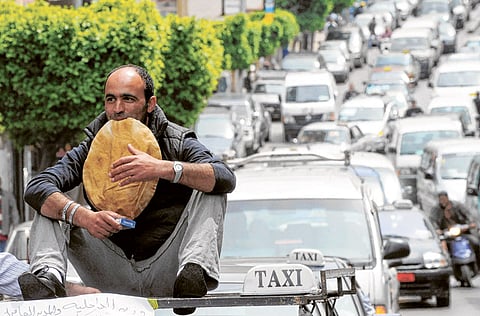Lebanon may be drawn into conflict
Years of Damascus influence and sectarianism could drag tiny nation into crisis

Beirut: The unrest sweeping Syria may whip up sectarian divisions that could spill across the border and threaten to destabilise Lebanon, a small neighbour where Damascus has both strong allies and enemies.
Tension already smoulders in Lebanon, where Hezbollah, supported by Syria and Iran, is at odds with caretaker Prime Minister Sa'ad Hariri, backed by the West and Saudi Arabia.
In focus: Unrest in the Middle East
Tiny Lebanon, with around four million people, has always been a battleground for bigger regional powers.
Syria, which had a military presence for 29 years until 2005, remains the most influential external player in Lebanon's sectarian politics.
"We have sides here who are linked to Syria and others who are enemies of it (who) would drag us into the crisis. God forbid if something happened there, Lebanon is not going to be immune," analyst Nabil Bu Munsif said.
The upheaval in Syria, where a rights group said on Tuesday 400 people have been killed by security forces, has sectarian undercurrents because of President Bashar Al Assad's minority Alawite rule in a mainly Sunni country.
Alawite loyalists occupy pivotal positions in the Syrian military and Al Assad family insiders run the crucial security bodies, tying senior officers closely to Al Assad's own fate.
"If there is sectarian tension between Alawites and Sunnis in Syria this will definitely spill over to Lebanon," said a Lebanese analyst, alluding to past fighting between Alawites and Sunnis in northern Lebanon.
"We have growing numbers of Sunni hardliners, this is clear, and it is all over the Middle East, and from the other side we have the Shiites getting more hardline — because of the conflict between Iran and the Gulf states. All of this is growing, so we should be scared. We are not immune," he said.
Interference
"When these countries were stable, we were paying a heavy price because of their interference, so imagine now that there is trouble there. We will pay an even heavier price."
For security reasons many Lebanese analysts declined to comment or be quoted by name for this article.
Underlining the tension, a little known Sunni militant group staged an anti-Assad demonstration in Lebanon's northern city of Tripoli on Friday and chanted demands for an Islamic caliphate.
Some analysts said Hezbollah might tighten its already strong grip on Lebanon's political fortunes if it felt that its main ally in Damascus was weakening.
A cosmopolitan Mediterranean country with 18 sects, Lebanon endured a 15-year civil war characterised by ethnic and sectarian bloodletting between Muslims and Christians.
The war ended in 1990 but many Lebanese felt justice was not served and many households still keep guns to hand, including AK-47 assault rifles and even rocket-propelled grenades.
"There is already plenty of tension in Lebanon and the Syria unrest will complicate relations in Lebanon, especially between the [Sunni] Future Movement led by Hariri and Hezbollah," a political science professor at a Lebanese university said. Syrian authorities, trying to crush five weeks of protests against Al Assad's authoritarian rule, have accused a Lebanese lawmaker from Hariri's bloc of stirring up the demonstrators and providing them with weapons to attack security forces.
Tension
Legislator Jamal Al Jarrah denied this. But, in a sign of the hair-trigger tension, pro-Syria Lebanese and Palestinian parties held a news conference immediately after the Syrian accusations and denounced what they called "foreign interference in Syria".
Some accused Hariri himself of being behind the demonstrations. "Lebanon is stable when Syria is stable. There is no security in Lebanon without security in Syria," Hezbollah lawmaker Nawaf Al Mussawi said at the conference.
Nabih Berri, the parliament speaker and head of Lebanon's Shiite Amal group, a Hezbollah ally and very close to Syria, said on Tuesday Lebanese had to "care for Syria's security and stability more than the Syrians".



